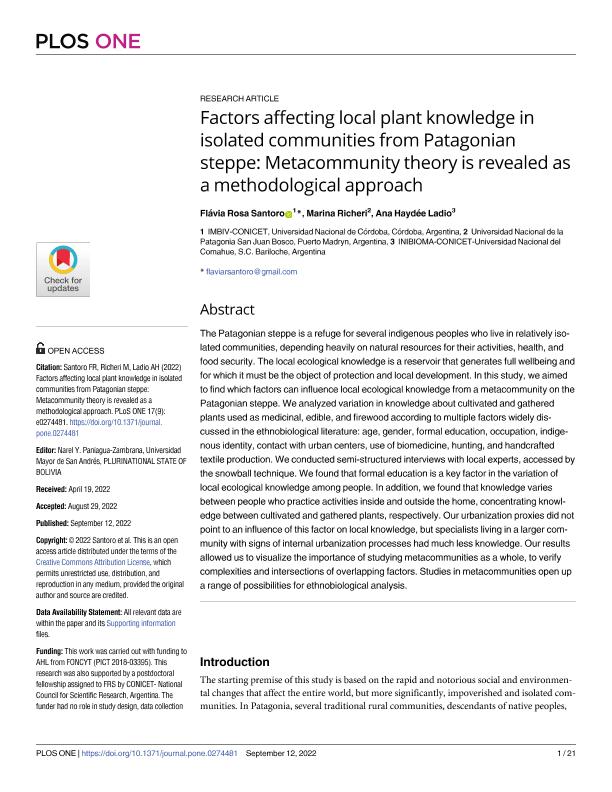Mostrar el registro sencillo del ítem
dc.contributor.author
Rosa Santoro, Flávia

dc.contributor.author
Richeri, Marina

dc.contributor.author
Ladio, Ana Haydee

dc.date.available
2023-06-29T21:52:40Z
dc.date.issued
2022-09
dc.identifier.citation
Rosa Santoro, Flávia; Richeri, Marina; Ladio, Ana Haydee; Factors affecting local plant knowledge in isolated communities from Patagonian steppe: Metacommunity theory is revealed as a methodological approach; Public Library of Science; Plos One; 17; 9; 9-2022; 1-21
dc.identifier.issn
1932-6203
dc.identifier.uri
http://hdl.handle.net/11336/201852
dc.description.abstract
The Patagonian steppe is a refuge for several indigenous peoples who live in relatively isolated communities, depending heavily on natural resources for their activities, health, and food security. The local ecological knowledge is a reservoir that generates full wellbeing and for which it must be the object of protection and local development. In this study, we aimed to find which factors can influence local ecological knowledge from a metacommunity on the Patagonian steppe. We analyzed variation in knowledge about cultivated and gathered plants used as medicinal, edible, and firewood according to multiple factors widely discussed in the ethnobiological literature: age, gender, formal education, occupation, indigenous identity, contact with urban centers, use of biomedicine, hunting, and handcrafted textile production. We conducted semi-structured interviews with local experts, accessed by the snowball technique. We found that formal education is a key factor in the variation of local ecological knowledge among people. In addition, we found that knowledge varies between people who practice activities inside and outside the home, concentrating knowledge between cultivated and gathered plants, respectively. Our urbanization proxies did not point to an influence of this factor on local knowledge, but specialists living in a larger community with signs of internal urbanization processes had much less knowledge. Our results allowed us to visualize the importance of studying metacommunities as a whole, to verify complexities and intersections of overlapping factors. Studies in metacommunities open up a range of possibilities for ethnobiological analysis.
dc.format
application/pdf
dc.language.iso
eng
dc.publisher
Public Library of Science

dc.rights
info:eu-repo/semantics/openAccess
dc.rights.uri
https://creativecommons.org/licenses/by-nc-sa/2.5/ar/
dc.subject
Ethnobiology
dc.subject
Local ecological knowledge
dc.subject
Socio-ecological systems
dc.subject
Arid environments
dc.subject.classification
Otras Ciencias Biológicas

dc.subject.classification
Ciencias Biológicas

dc.subject.classification
CIENCIAS NATURALES Y EXACTAS

dc.title
Factors affecting local plant knowledge in isolated communities from Patagonian steppe: Metacommunity theory is revealed as a methodological approach
dc.type
info:eu-repo/semantics/article
dc.type
info:ar-repo/semantics/artículo
dc.type
info:eu-repo/semantics/publishedVersion
dc.date.updated
2023-06-29T10:09:08Z
dc.journal.volume
17
dc.journal.number
9
dc.journal.pagination
1-21
dc.journal.pais
Estados Unidos

dc.journal.ciudad
San Francisco
dc.description.fil
Fil: Rosa Santoro, Flávia. Consejo Nacional de Investigaciones Científicas y Técnicas. Centro Científico Tecnológico Conicet - Córdoba. Instituto Multidisciplinario de Biología Vegetal. Universidad Nacional de Córdoba. Facultad de Ciencias Exactas Físicas y Naturales. Instituto Multidisciplinario de Biología Vegetal; Argentina
dc.description.fil
Fil: Richeri, Marina. Universidad Nacional de la Patagonia "San Juan Bosco"; Argentina. Consejo Nacional de Investigaciones Científicas y Técnicas. Centro Científico Tecnológico Conicet - Centro Nacional Patagónico; Argentina
dc.description.fil
Fil: Ladio, Ana Haydee. Universidad Nacional del Comahue. Centro Regional Universitario Bariloche; Argentina. Consejo Nacional de Investigaciones Científicas y Técnicas. Centro Científico Tecnológico Conicet - Patagonia Norte. Instituto de Investigaciones en Biodiversidad y Medioambiente. Universidad Nacional del Comahue. Centro Regional Universidad Bariloche. Instituto de Investigaciones en Biodiversidad y Medioambiente; Argentina
dc.journal.title
Plos One

dc.relation.alternativeid
info:eu-repo/semantics/altIdentifier/doi/http://dx.doi.org/10.1371/journal.pone.0274481
dc.relation.alternativeid
info:eu-repo/semantics/altIdentifier/url/https://journals.plos.org/plosone/article?id=10.1371/journal.pone.0274481
Archivos asociados
